Agathe | 27 | ♋ Cancer | Gradblr (Marketing & Communication) | Hufflepuff house | INFP | Langblr
Don't wanna be here? Send us removal request.
Note
Any online Finnish courses you recommend (if any)?
I have never been a language course taker myself. I feel like whenever I take a language course I just learn whatever they teach me and nothing else. That's not learning, it's memorizing. However I can try to find something.
This is not a course, but a list of Yle-Approved Finnish materials. There are videos and exercises etc. for all kinds of learners. Includes the YKItreenit.
Here is a pretty comprehensive list of all "official" online Finnish courses you can sign up for. Many are expensive.
If you seek free courses, look at this list. Puhekielen Verkkokurssi is very cool if you need to learn puhekieli.
Here are some more Finnish courses. You can change the search conditions to fit your situation.
If you are looking to learn Finnish for moving to Finland, make sure the course you are taking is Yki-compatible.
35 notes
·
View notes
Text
ok, this is amazing. I found a great site with short stories in 34 languages!
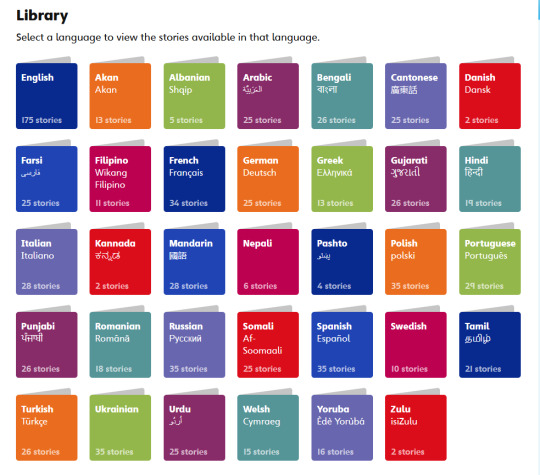
"WorldStories is a growing collection of stories from around the world. The collection includes retold traditional tales and new short stories in the languages most spoken by UK children.
We are adding new stories, translations, pictures and sound recordings every week. So keep coming back to enjoy new content!"
2K notes
·
View notes
Text
google drive of free korean language learning resources
hi everyone! because i put tutoring on hold while i am working full time but still want to provide help to those who want to start learning/want to practice their korean, i am continuously compiling material for free learning :)
resources are totally free!
most are typically aimed at children (which is great for beginners!!)
hangul practice
vocabulary building
printable/downloadable
example of scans:
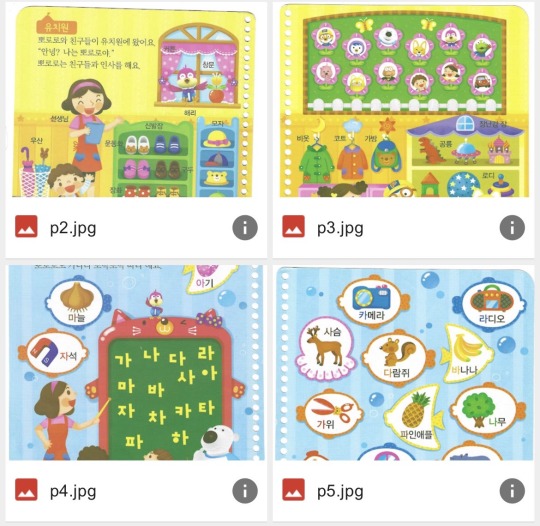
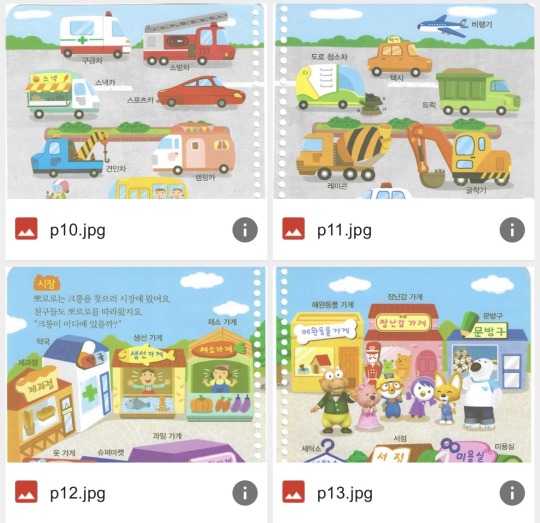
example of grammar breakdowns:
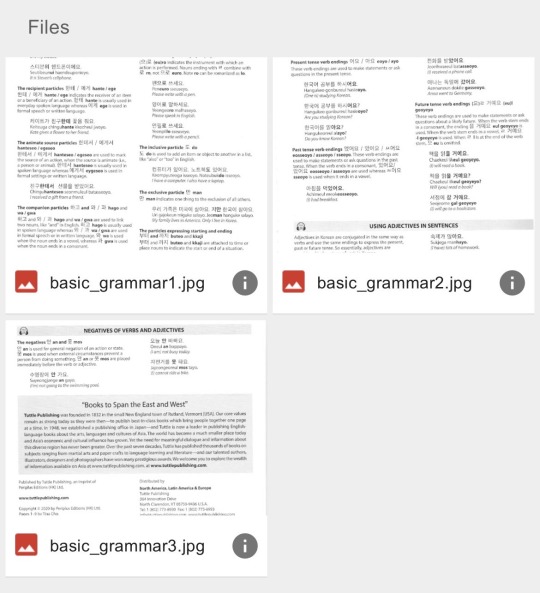
i will be adding material over the coming weeks and continuously as i come across material! updates may be frequent or slow down at times.
note: resources are free, and they’re totally free to share and use! but please do not repost without credit, and because i buy these from my workplace with my own money and spend time scanning them and cleaning them up and organizing them, please consider tipping me as much as you’d like ♥️
here is the link to the drive! (sorry, can’t hyperlink on mobile currently)
enjoy, and thank you in advance! have fun and feel free to ask me any questions—i am a korean studies grad and was a tutor for the beginning korean classes at my university. i am happy to help however i can!
♥️ joey
2K notes
·
View notes
Text
NEW Masterlist
안녕하세요 여러분! Hi everyone! I realized that my old masterlist was getting SUPER long, so I decided to break it up! Now this is a list of smaller lists of lessons based on levels. I hope this makes it easier to navigate my Tumblr and looks a little less overwhelming :) To see all of my lessons on one page, though, click here!
My lessons are organized based on how advanced I think they are in my personal opinion, but I recommend browsing each level and just looking at what you want to learn. If a lesson has any “prerequisites,” meaning you need to know a different concept before you can learn about the one in that particular lesson, I probably mention that. My point is what might be “intermediate” for me might not be “intermediate” for you, so just look around!
As always, feel free to message me with any messages you may have about any of these lessons!! Happy studying! 화이팅!
Hangul Lessons & The Basics
Beginner & Upper-Beginner Lessons
Intermediate & Upper-Intermediate Lessons
Advanced Lessons
Vocabulary, Hanja Lessons, & Charts
K-Pop Breakdowns
Semester in SK
4K notes
·
View notes
Text
Duolingo Sucks, Now What?: A Guide
Now that the quality of Duolingo has fallen (even more) due to AI and people are more willing to make the jump here are just some alternative apps and what languages they have:
"I just want an identical experience to DL"
Busuu (Languages: Spanish, Japanese, French, English, German, Dutch, Italian, Portuguese, Chinese, Polish, Turkish, Russian, Arabic, Korean)
"I want a good audio-based app"
Language Transfer (Languages: French, Swahili, Italian, Greek, German, Turkish, Arabic, Spanish, English for Spanish Speakers)
"I want a good audio-based app and money's no object"
Pimsleur (Literally so many languages)
Glossika (Also a lot of languages, but minority languages are free)
*anecdote: I borrowed my brother's Japanese Pimsleur CD as a kid and I still remember how to say the weather is nice over a decade later. You can find the CDs at libraries and "other" places I'm sure.
"I have a pretty neat library card"
Mango (Languages: So many and the endangered/Indigenous courses are free even if you don't have a library that has a partnership with Mango)
Transparent Language: (Languages: THE MOST! Also the one that has the widest variety of African languages! Perhaps the most diverse in ESL and learning a foreign language not in English)
"I want SRS flashcards and have an android"
AnkiDroid: (Theoretically all languages, pre-made decks can be found easily)
"I want SRS flashcards and I have an iphone"
AnkiApp: It's almost as good as AnkiDroid and free compared to the official Anki app for iphone
"I don't mind ads and just want to learn Korean"
lingory
"I want an app made for Mandarin that's BETTER than DL and has multiple languages to learn Mandarin in"
ChineseSkill (You can use their older version of the course for free)
"I don't like any of these apps you mentioned already, give me one more"
Bunpo: (Languages: Japanese, Spanish, French, German, Korean, and Mandarin)
86K notes
·
View notes
Text
https://www.youtube.com/@HEYboja


For Korean learners, especially those studying for the TOPIK exam, I really recommend this channel! It goes over mostly reading questions from past TOPIK papers, nicely presenting the content one sentence at a time at a really nice pace so that there's no need for pausing even. Clean and simple!!
Mostly for intermediate to advanced, I suppose, but maybe helpful regardless :)
32 notes
·
View notes
Text
Not studied Finnish yet? This is your sign!
Here are the absolute basics of the language in an even tighter package compared to my earlier posts. Maybe someone new will take interest in the language from these posts!

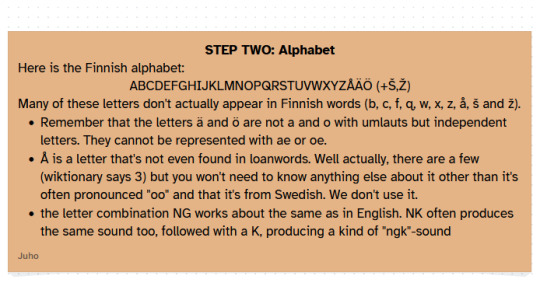
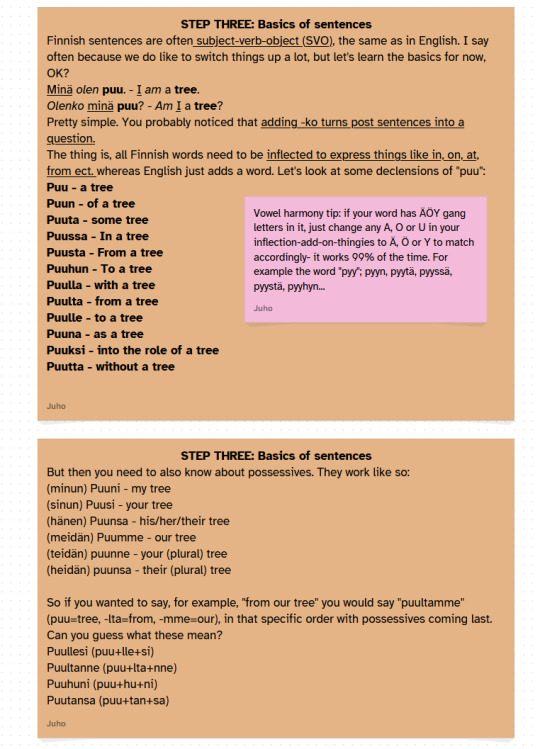
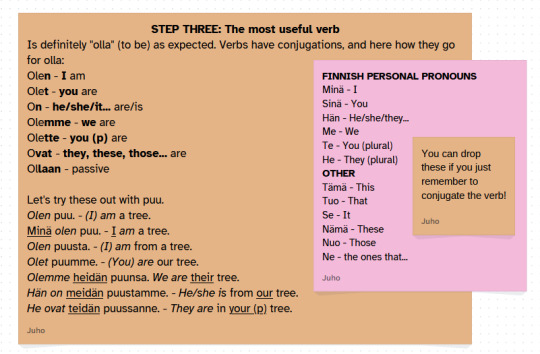
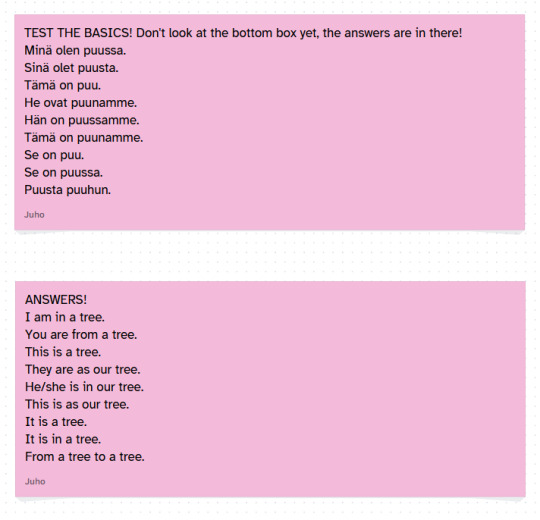
To my existing followers, are these kinds of posts good for you? Could my normal posts be in this format sometimes too?

437 notes
·
View notes
Text
More beginner Finnish because a lot of people liked the first one




163 notes
·
View notes
Text
i haven't seen anyone talk about it before, but there's a site called 21st Century Chinese Poetry that has a massive collection of contemporary chinese poetry, including english translations thereof, for anyone who, like me, is interested in poetry but may feel a bit intimidated by the more literary nature of classical poetry. currently, they have poetry from between 2000-2021, and i, personally, have rather enjoyed poking around the site.
882 notes
·
View notes
Text
Multilingual vocabulary about time
ENG - ITA - FRA - ESP - KOR
time - (il) tempo/(l')ora - (l')heure - (la) hora - 시간
morning - (il) mattino/(la) mattina - (le) matin - (la) mañana - 아침
afternoon - (il) pomeriggio - (l')après-midi - (la) tarde - 점심
evening - (la) sera - (le) soir - (la) tarde/(la) noche - 저녁
night - (la) notte - (la) nuit - (la) noche - 밤
noon/midday - (il) mezzogiorno - (le) midi - (el) mediodía - 정오
midnight - (la) mezzanotte - (le) minuit - (la) medianoche - 자정
early - presto - de bonne heure - temprano - 일찍
late - tardi - tard - tarde - 늦게
soon - presto - bientôt - pronto - 곧
later - dopo/più tardi - plus tard - más tarde - 나중에
now - adesso/ora - maintenant - ahora - 지금/이제
when...? - quando...? - quand...? - cuando...? - 언제…?
what time is it? - che ore sono? - quelle heure est-il? - qué hora es? - 몇 시예요?
hour - ora - heure - hora - 시
minute - minuto - minute - minuto - 분
second - secondo - seconde - segundo - 초
it's seven o'clock - sono le sette (in punto) - il est sept heures - son las siete (en punto) - 일곱시예요
it's seven fifteen/it's a quarter past seven - sono le sette e un quarto - il est sept heures et quart - son las siete y cuarto/y quince - 일곱시 십오분이에요
it's half past seven/it's seven thirty - sono le sette e mezza/sono le sette e trenta - il est sept heures trente/il est sept heures et demie - son las siete y media - 일곱시 반이에요 / 일곱시 삼십분이에요
it's a quarter to seven - manca un quarto alle sette/sono le sette meno un quarto - il est sept heures moins le quart - son las siete meno cuarto - 일곱시 십오분 전이에요
it's seven a.m. - sono le sette di mattina - il est sept heures du matin - son las siete de la mañana - 오전 일곱시에요
it's seven p.m. - sono le sette di sera - il est sept heures du soir - son las siete de la tarde/noche - 오후 일곱시에요
in 30 seconds - in 30 secondi - en/dans 30 secondes - en/dentro de treinta segundos - 삼십초 안에
in two minutes - in due minuti - en/dans deux minutes - en/dentro de dos minutos - 이분 안에
in one hour - in un'ora - en/dans une heure - en/dentro de una hora - 한시간 안에
in fifteen minutes/in a quarter of an hour - in quandici minuti/in un quarto d'ora - en/dans quinze minutes/dans un quart d'heure - en/dentro de quince minutos - 십오분 안에
in half an hour/in thirthy minutes - in mezz'ora/in trenta minuti - en/dans trente minutes/dans une demie-heure - en/dentro de treinta minutos - 삼십분 안에
91 notes
·
View notes
Text
This is my personal study plan for each language (Spanish, Russian and Korean). I've included links to all the FREE RESOURCES!!! including textbook PDFs, YouTube channels and more...
Spanish Study Plan (Links!!)
15 mins on each task = 45 mins
Flashcards/sentences
Reading a book (Olly Richards/random)
Audio (Karo podcast/Easy Spanish)
Bonus = Collins Grammar + Vocab book and Assimil Spanish
Russian Study Plan (Links!!)
Stage 1
Assimil Russian lesson (30 mins)
Audio - Easy Russian, film, etc (15 mins)
Stage 2
Flashcards/phrases
Olly Richards Russian Short Stories
Audio - Easy Russian, film, etc
Stage 3
Penguin Russian Course book
Classic literature
Audio - films
Korean Study Plan (Links!!)
Daily = textbook study (30 mins) + Viki kdrama audio (30 mins)
Order of textbooks:
Korean Made Simple
TTMIK Levels 1-9
My First 500 Korean Words
Real-Life Conversations (Beginner)
Real-Life Conversations (Intermediate)
My Daily Routine in Korean
Short Stories in Korean (Intermediate)
Happy learning :)
638 notes
·
View notes
Text
Resource List for Learning Italian
Hi Language Enthusiasts,
Do you want to learn Italian but don’t know where to start? Then I’ve got the perfect resource list for you and you can find its links below. Let me know if you have any suggestions to improve it. I hope everyone can enjoy it and if anyone notices any mistakes or has any questions you are free to PM me.Here is what the resource list contains;
Handmade resources on certain grammar concepts for easy understanding.
Resources on learning pronunciation.
Websites to practice reading.
Documents to enhance your vocabulary.
Notes on Colloquial Language and Dialects.
Music playlists
List of podcasts/audiobooks And a compiled + organized list of websites you can use to get hold of grammar!
https://docs.google.com/document/d/1FglJ9FG3lVR1UedmCYgTc3Cb9mIyT3TGxD95lbmZOp4/edit?usp=sharing
131 notes
·
View notes
Text
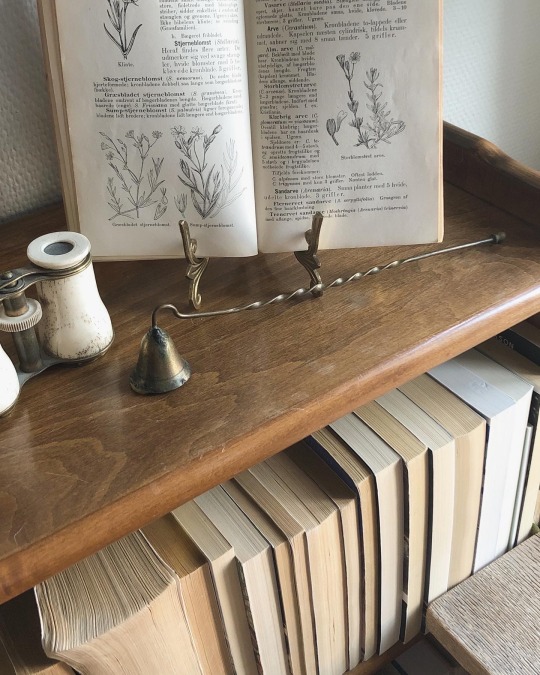



slow days, revising, coffee, heavy rain, familiar comforts, residual hauntings, nettle tea, books smelling like caramel
229 notes
·
View notes
Text
What about a Bullet Journal dedicated to language learning?
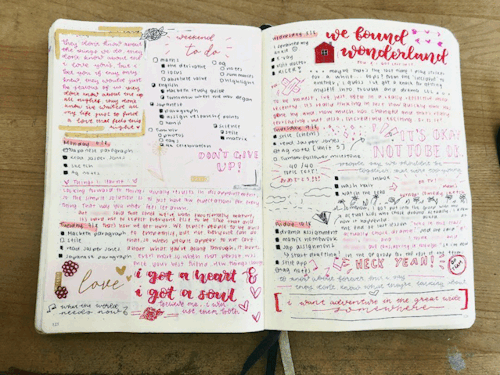
New post today! YAAAAY, I missed blogging sooooo much but I came back home to visit my parents. You guys know, if you follow me on Instagram too, that I looooove the Bullet Journal method, I use it every day for my studies and right now for work too. So why not creating a new bullet journal only dedicated to language learning? Here’s what are the possible useful spreads I will create in the near future:
Yearly log: probably a vertical spread and for each month I will list the goals I want to reach in each language
Monthly log: a classic monthly log but with the days in the middle, on the left side I will list what are my daily goals and on the other one I will write what I actually did
Monthly tracker: for each day I’ll track how many hours or minutes I’ll spend for each language (color coding needed)
Level 10 fluency: for each language, I will list how much I feel fluent in each category (reading, writing, speaking, listening) from 1 to 10
Resources log: for each language, I will dedicate one page in order to list all the resources I use or I have in store and I’ll also track for which field it’s useful
Textbooks collection: for each language, I will list the textbooks, both physical and digital, I have
Lag-podcasts collection: a list dedicated to languages podcasts I listen to and I will discover
Favorite Tumblr masterposts: you know that here on Tumblr there are tons and tons of very useful masterposts, so why not creating a collection for them in order to always remember them?
What I learned this month: as the last page for one month, it would be nice to keep track of what you studied and understood
Website/Blog collection: I follow too many interesting blogs and sometimes I can’t even remember their names, this collection would be teeeeerribly useful for me
Fluency tracker: let this Pinterest pic speak for me
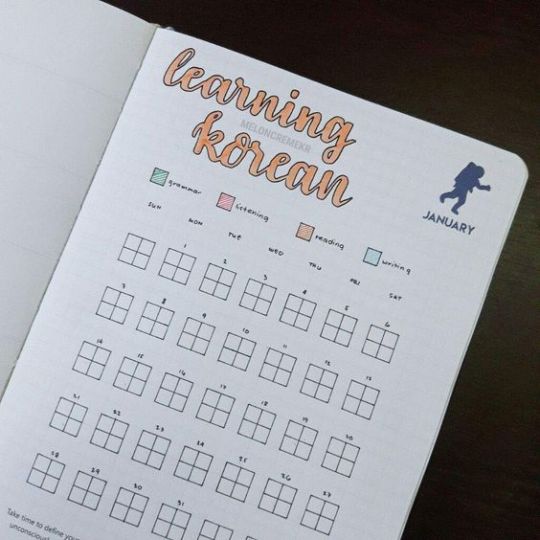
So guys what do you think about this idea? Would you like to see the #langbujo in a new article as soon as I will complete some pages and some spreads? Stay tuned!!
3K notes
·
View notes
Text
Bullet Journal for language learners and students
Finally, after months of many tries, I figured out the best method for me to incorporate some useful spread for language learners and students.
Let’s see how I structure an entire month into my bullet journal
Cover: for each month I create a cover that is going to represent the main theme I chose
- disclaimer: the majority of the photos are from my May spreads and theme was “peachy colors”
Monthly log: a classic monthly log structured as a calendar and I added a little goals list in which I write what I want to accomplish during those 30/31 days
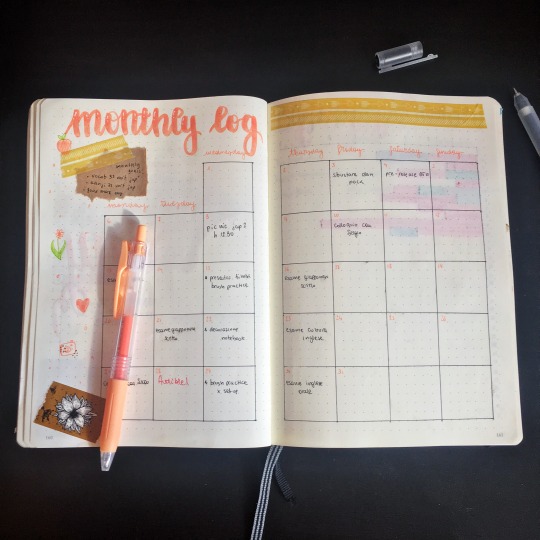
Study Tracker: a monthly tracker in which I write how many hours I studied during that day and I use different colors based on a color coding for the different languages and subjects I study (photo from June’s theme)
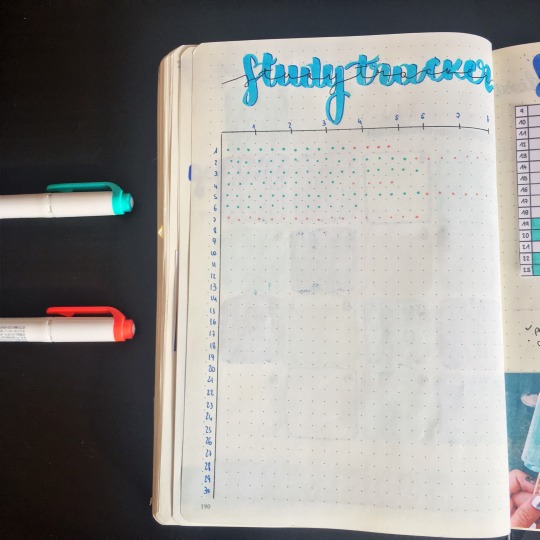
Blog, podcasts, Tumblr blogs, and masterposts log: a list of useful and interesting websites, podcasts, Tumblr blogs and masterposts in which I write the name, the category and languages discussed

Resources log: for each language, I write in the title, what is that resource is about (ex.: grammar, vocab, textbook…) and I rate them after using it for a while
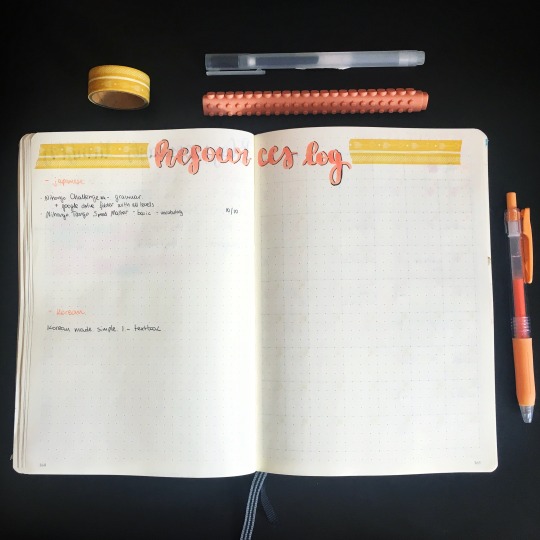
Semester tracker: it is mainly based on my university semester (which is not a full semester idkwhy, but 4 months). This big calendar groups 4 months together and each month has its reference color and in the boxes, I write in exams, deadlines, appointments and stuff like that

Daily logs: this is how my daily logs look like! I created an excel sheet that resembles the 10 minutes method of Korean/Japanese study planners for each day of the month, on one side I write a to-do list for the day, and last but not least I decorate it with different tools such as brush pens, stamps, and washi tapes

Guys this is it! For next month I will use a new bullet journal because this lovely Leucchturm1917 is almost over. So maybe I’ll do an update if something is gonna change!
1K notes
·
View notes
Text

261022 | Day 3 of Langblr Reactivation Challenge
Today's prompt is all about creating a list of topics I would like to study the vocabulary for in basically all of my target languages, but I think my priority will be 日本語
school
stationery
pagan/witchcraft
food and drink
tarots
love and relationship
pokémon
personality traits
daily routine
langblr community
cozy vocabulary
words of encouragement
music
astrology and horoscopes
bullet journal
feelings and emotions
weather
and yes, I went through all 37 pages of vocabulary lists in Finnish made and reblogged by @tealingual
10 notes
·
View notes
Text
How to learn a language when you don’t know where to start:
General Plan:
Weeks 1 and 2: Purpose:
Learn the fundamentals sentence construction
Learn how to spell and count
Start building a phrase stockpile with basic greetings
The Alphabet
Numbers 1 - 100
Subject Pronouns
Common Greetings
Conjugate the Two Most Important Verbs: to be and to have
Basic Definite and Indefinite Articles
Weeks 3 and 4: Purpose:
Learn essential vocabulary for the day-to-day
Start conjugating regular verbs
Days of the Week and Months of the Year
How to tell the time
How to talk about the weather
Family Vocabulary
Present Tense Conjugations Verbs
Weeks 5 and 6: Purpose:
Warm up with the last of the day-to-day vocabulary
Add more complex types of sentences to your grammar
Colours
House vocabulary
How to ask questions
Present Tense Conjugations Verbs
Forming negatives
Weeks 7 and 8: Purpose:
Learn how to navigate basic situations in a region of your target language country
Finish memorising regular conjugation rules
Food Vocabulary and Ordering at Restaurants
Money and Shopping Phrases
Present Tense Conjugations Verbs
Weeks 9 and 10: Purpose:
Start constructing descriptive and more complex sentences
Adjectives
Reflective verbs
Places vocabulary
Weeks 11 and 12: Purpose:
Add more complex descriptions to your sentences with adverbs
Wrap up vocabulary essentials
Adverbs
Parts of the body and medical vocabulary
Tips for Learning a Foreign Language:
Learning Vocabulary:
What vocabulary should I be learning?
There are hundreds of thousands of words in every language, and the large majority of them won’t be immediately relevant to you when you’re starting out.Typically, the most frequent 3000 words make up 90% of the language that a native speaker uses on any given day. Instead try to learn the most useful words in a language, and then expand outwards from there according to your needs and interests.
Choose the words you want/need to learn.
Relate them to what you already know.
Review them until they’ve reached your long-term memory.
Record them so learning is never lost.
Use them in meaningful human conversation and communication.
How should I record the vocabulary?
Learners need to see and/or hear a new word of phrase 6 to 17 times before they really know a piece of vocabulary.
Keep a careful record of new vocabulary.
Record the vocabulary in a way that is helpful to you and will ensure that you will practice the vocabulary, e.g. flashcards.
Vocabulary should be organised so that words are easier to find, e.g. alphabetically or according to topic.
Ideally when noting vocabulary you should write down not only the meaning, but the grammatical class, and example in a sentence, and where needed information about structure.
How should I practice using the vocabulary?
Look, Say, Cover, Write and Check - Use this method for learning and remembering vocabulary. This method is really good for learning spellings.
Make flashcards. Write the vocabulary on the front with the definition and examples on the back.
Draw mind maps or make visual representations of the new vocabulary groups.
Stick labels or post it notes on corresponding objects, e.g when learning kitchen vocabulary you could label items in your house.
How often should I be practising vocabulary?
A valuable technique is ‘the principle of expanding rehearsal’. This means reviewing vocabulary shortly after first learning them then at increasingly longer intervals.
Ideally, words should be reviewed:
5-10 minutes later
24 hours later
One week later
1-2 months later
6 months later
Knowing a vocabulary item well enough to use it productively means knowing:
Its written and spoken forms (spelling and pronunciation).
Its grammatical category and other grammatical information
Related words and word families, e.g. adjective, adverb, verb, noun.
Common collocations (Words that often come before or after it).
Receptive Skills: Listening and Reading
Reading is probably one of the most effective ways of building vocabulary knowledge.
Listening is also important because it occupies a big chunk of the time we spend communicating.
Tips for reading in a foreign language:
Start basic and small. Children’s books are great practice for beginners. Don’t try to dive into a novel or newspaper too early, since it can be discouraging and time consuming if you have to look up every other word.
Read things you’ve already read in your native language. The fact that you at least know the gist of the story will help you to pick up context clues, learn new vocabulary and grammatical constructions.
Read books with their accompanying audio books. Reading a book while listening to the accompanying audio will improve your “ear training”. It will also help you to learn the pronunciation of words.
Tips for listening in a foreign language:
Watch films in your target language.
Read a book while also listening along to the audio book version.
Listen to the radio in your target language.
Watch videos online in your target language.
Activities to do to show that you’ve understood what you’ve been listening to:
Try drawing a picture of what was said.
Ask yourself some questions about it and try to answer them.
Provide a summary of what was said.
Suggest what might come next in the “story.”
Translate what was said into another language.
“Talk back” to the speaker to engage in imaginary conversation.
Productive Skills: Speaking and Writing
Tips for speaking in a foreign language:
If you can, try to speak the language every day either out loud to yourself or chat to another native speaker whether it is a colleague, a friend, a tutor or a language exchange partner.
Write a list of topics and think about what you could say about each one. First you could write out your thoughts and then read them out loud. Look up the words you don’t know. You could also come up with questions at the end to ask someone else.
A really good way to improve your own speaking is to listen to how native speakers talk and imitate their accent, their rhythm of speech and tone of voice. Watch how their lips move and pay attention to the stressed sounds. You could watch interviews on YouTube or online news websites and pause every so often to copy what you have just heard. You could even sing along to songs sung in the target language.
Walk around the house and describe what you say. Say what you like or dislike about the room or the furniture or the decor. Talk about what you want to change.This gets you to practise every day vocabulary.
Tips for writing in a foreign language:
Practice writing in your target language. Keep it simple to start with. Beginner vocabulary and grammar concepts are generally very descriptive and concrete.
Practice writing by hand. Here are some things you can write out by hand:
Diary entries
Shopping lists
Reminders
What could I write about?
Write about your day, an interesting event, how you’re feeling, or what you’re thinking.
Make up a conversation between two people.
Write a letter to a friend, yourself, or a celebrity. You don’t need to send it; just writing it will be helpful.
Translate a text you’ve written in your native language into your foreign language.
Write a review or a book you’ve recently read or a film you’ve recently watched.
Write Facebook statuses, Tweets or Tumblr posts (whether you post them or not will be up to you).
Write a short story or poem.
Writing is one of the hardest things to do well as a non-native speaker of a language, because there’s no room to hide.
There are lots of ways to improve your writing ability, but they can be essentially boiled down to three key components:
Read a lot
Write a lot
Get your writing corrected
28K notes
·
View notes